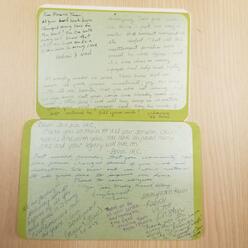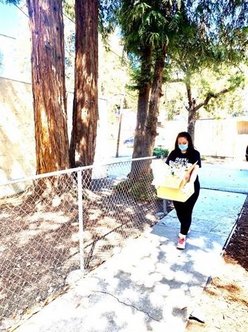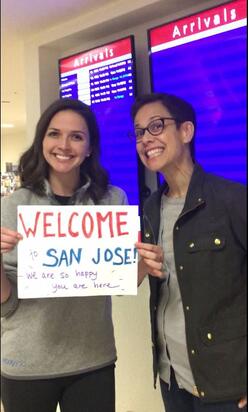By Michelle Borrego and Bella Mendoza
Volunteer and Donations Coordinator and Social Media Intern for the IRC in San Jose
The Loss
Humanitarian crises are nothing new. Some of the first migrants to what is now the United States were refugees by definition. In an effort to honor the immigrant roots of this nation and set the United States as a humanitarian leader, the Refugee Act of 1980 was passed on March 17, 1980. Since then, the United States has resettled over 3 million refugees, with an average refugee ceiling of 90,000 per fiscal year. Unfortunately, the historically bipartisan program saw a drastic drop in support during the past few years. When the FY 2017 refugee ceiling was set at 50,000, it was the lowest ever at the time—even lower than the 70,000 refugee ceiling (FY 2002) set in the wake of 9/11. As shocking as this was, support for refugee resettlement only decreased in the following years.

As time progressed and arrivals trickled in, resettlement agencies were forced to re-evaluate their size. The International Rescue Committee (IRC) stood firm hoping to avoid closing any resettlement programs, but ultimately had to zero-out the resettlement program in one of its offices.
Faced with this decision, the IRC deeply examined which office’s resettlement program closure would have the least negative impact. Unfortunately, the San Jose office was selected. On December 20, 2018, 40 minutes before the workday ended, the San Jose staff was informed its resettlement program was being zeroed out, effective Jan. 1, 2019. The news was shared across the network the following morning.
This came as a huge shock to all at IRC, as the news was sudden and abrupt. IRC San Jose staff were left wondering if this meant the location would close. Perhaps the most concerned were the resettlement caseworkers. If there was no resettlement program, there was no need for resettlement caseworkers, right? Luckily, no one was left unemployed as the San Jose resettlement caseworkers were immediately re-assigned to work with the IRC in Oakland due to a shortage of caseworkers in that location and the close proximity of the offices which would ease the re-assignment.
While no one was left without a job, the IRC in San Jose had to innovate to sustain operating without arrivals as this program provided the pipeline of clients for the other programs offered at this location.
The Limbo
“This is just temporary; resettlement is coming back to San Jose,” echoed in the minds of IRC staff. Faced with the new reality of being a refugee resettlement office without an active refugee resettlement program, the IRC in San Jose had to pivot, innovate and adapt like never before.

The IRC in San Jose opened in 1979 to resettle the mass influx of Vietnamese refugees arriving at that time. Since then the San Jose location has resettled nearly 25,000 refugees from all over the world, with a peak of 1,916 arrivals in 1991. Small but mighty, and with more than 40 years of expertise, the IRC in San Jose has robust casework services, employment programs, career development, financial empowerment and immigration services that allowed the location to remain open and operational without an active resettlement program, a feat many were unable to accomplish.
In the meantime, while the IRC in San Jose counted down the days until the resettlement program resumed, its staff focused on getting more support for its programs and growing the number of programs and services it had to offer. The office launched youth-focused programming in late 2019, grew its employment and career development services, and even began serving other populations who are working their way through the immigration process and have similar needs as refugees, but lack that status.
“We are going to keep on building our programming and help those that need help right now with the intent of having better programming available when resettlement does come back to San Jose,” said Sead Eminovic, Director of the IRC in San Jose.
The Comeback
After 835 days without the resettlement program at the IRC in San Jose, the office's leadership team received word last month that the location had gotten approval to re-open its resettlement program, effective immediately. The staff was ecstatic and reflected on the hardships of the past 835 days. “It's been a long few years; we have lost staff who saw their jobs at risk, risked programs that depend on steady Office of Refugee Resettlement client pipelines, and stuck through it to find ways to support our community without resettlement," said Kevin Davis, Senior Career Development Specialist for the IRC in San Jose. "I'm very proud of our San Jose team.”

In preparation for the relaunch of this program, the San Jose location has begun the hiring process for resettlement staff. It is also gathering supplies to meet the in-kind donation needs of newly arrived families and is preparing its other programs for an influx of enrollments. The IRC in San Jose will resettle up to 25 refugees by the end of this fiscal year which ends September 30th and is estimating 165 arrivals in the following fiscal year.
“As the resilient team we are, we got through this hardship," Sead said. "That's one thing we do in San Jose. We put our heads together and figure out a way to get things done. So that's what we are going to have to do again. All hands on board."
The IRC in San Jose has been pleased to see strong support from the Office of Population, Migration, and Refugees, IRC headquarters and the welcoming community around them. The past few years—particularly the 835 days without resettlement—tested the resilience of the office. However, the office rose to the challenge and came out ahead. With more programming and staff than at the time of resettlement’s closure, the San Jose team is ready to welcome new arrivals and get back to helping those who need the crucial services of the IRC.
Andrea Vidal, Youth Programs Supervisor for the IRC in San Jose, said she looks forward to seeing refugees arriving with their International Organization for Migration (IOM) in hand.
"I’m so proud of our team for bouncing back from the shock of losing resettlement over the holidays in 2018 to growing the office with multiple new programs and sticking through the real difficulties of hardcore community outreach to bridge us through."
Click here to learn about ways YOU can support the re-launch of resettlement at the IRC in San Jose!